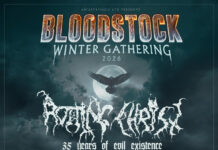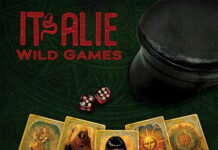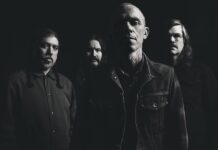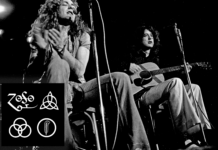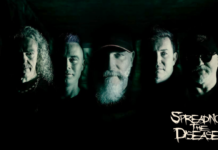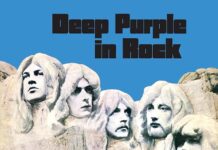Back in early September, I had the great pleasure of talking to renowned guitarist Craig Goldy whose inspired work with Dio, Resurrection Kings, and Dream Child is the stuff that hard rock/heavy metal dreams are made of. Yours truly was blown away by Resurrection Kings’ latest offering, the epic and evocative opus that is Skygazer (released by Frontiers Records in July 2021), and so this seemed like the perfect opportunity to discuss said record with Goldy and his stellar work with the Dio band among many other things. Truth to be told, it was much more akin to an informal chat between two friends than an actual interview and so what we have here is essentially the short, concise version of our talk. Enjoy, ladies and gentlemen.
Hey Craig!
Craig: Well, hello there.
How are you doing?
C: I’m good. How are things over there?
I’m good, thanks for asking. I’m all set and ready to go. I got my coffee and everything.
C: Excellent! I’m really glad we could do this.
Me too! Let me start out by paying you a compliment. Back in the day when you were touring with the Dio band, more specifically in 2006, I met you and Rudy Sarzo. This was in Aarhus in Denmark. You guys were, without doubt, the coolest dudes ever and you took the time to sign my stuff and hang out and talk. There was no rush or anything like that, and we discussed all kinds of things – it just meant the world to me.
C: Thank you! It is the other side of the coin because it means the world to me to imagine that someone would feel that way because they were there for Ronnie, and I’m a big fan of Ronnie. So, when somebody says stuff like that to me, it’s like “Wow” because I never really thought in those terms. Rudy and Ronnie were really close too, so when the three of us were in the band together it was great because we were all pretty much of the same heart. We didn’t rush anybody. Ronnie would stay forever. When I first joined the band and every time I was back in the band, most of the time right after the concert everybody else in the band would kind of hang out and go to the bar and so on, but even Ronnie stood out there and would sign every autograph and take every picture until 2 or 3 o’clock in the morning and he would go back and hang out with the crew and the truck drivers and the security guards and say “Thank you”. By the time we got to the hotel, it would be 3 AM and there would be even more people in the hotel lobby. He was so gracious, we’d talk to the fans, there was no rushing, and we had a 6 AM lobby call the next day and it was already the next day ha-ha – like three hours from now. We just had time to take a shower, get dressed, pack and get on the bus to the next gig. It wasn’t tiring, it was quite refreshing because we were making people happy.
Some of my most precious memories are of watching you guys perform on stage and meeting you outside the venues and so on. That’s the stuff that dreams are made of.
C: I know exactly what you mean. Sometimes you get rock stars who are nice because it’s good customer service, but Ronnie wasn’t like that. Ronnie loved everybody and he had a special gift where he could zero in on you and find out what made you unique. He was interested in who you were and so during that process, you had a special connection. You actually felt like a friend, and you felt love and respect. You could see it in his eyes. He would look into your eyes like you were the only one in the room who mattered, and you would walk away with a memory that you would cherish for the rest of your life and that is how he was. Because each person was different and unique, each one had a special connection with him even though he was the same man.
That’s one of the things that so many fans love and cherish about Ronnie. He was so genuine.
C: He truly was, and he was so deep. He loved to blow people’s minds with kindness. If you saw him on stage, he would seem really strong and powerful, and there is a different persona sometimes on stage, so if you’d never met him yet he could seem like this mean, dark man up there. And so when people met him backstage, he would treat you like his best friend and go “Hey, how are you doing? Can I get you a drink or make you some food?” and people would be blown away and their heads would be spinning around in circles ha-ha.
That’s one of the things that made him so unique.
C: That was my favorite part of touring with him and now that’s my favorite part of touring with the Dio Disciples where you talk to people and try to keep His way Alive, you know. That’s my favorite part.

I’m glad to hear that. I remember when I met you and Rudy, I was so inspired when I left the venue. There was a sense of warmth and happiness and being inspired. That’s a beautiful thing.
C: It really is, and it’s really just the true meaning of the phrase “Paying it Forward”.
Speaking of which, I really hope that I get a chance to see the Dio Disciples perform over here in Europe someday. I don’t know if you guys are planning anything next year with respect to touring.
C: I know that Wendy is trying to make some plans. I’m just hoping that everything, physically, gets back to normal. I don’t really want to jump on the tour and not be 100 percent because that stuff is so important to me. Most of the time people poke fun at me because I’m just standing there, and they think I’m like the sourpuss but to me, it’s not a rock concert – it’s a memorial service. Each and every note is loaded with memories because that was the music I grew up to. If it was Rainbow, that was the music that meant so much to me when I joined the band Dio. Especially the times when I was sitting side by side with Ronnie and writing some stuff and then when we played that music together as well as the fact that we became friends and all of that. Every note and chord are loaded with memories and power. You could go rock out and jump around and look like a rock star any other time, but that’s not the time for it – for me personally, that is, I take it really seriously and want to make it sound as good as possible. The other guys, like Bjorn (Engen, the Dio Disciples bass player) for instance, they rock out, and it’s still a rock concert, but I’m just the quiet, serious one on stage ha-ha.
I saw the Dio band perform five times and to me you always seemed focused and disciplined.
C: Many times, that was true. On the Magica tour, it was a lot easier to move around. I was in great shape and had just lost a lot of weight. I’d just rejoined the band and Ronnie and I were stronger than ever. That was completely different and was like a 2-and-a-half-hour concert, and I would move around…and that was the time to put on a show and rock out, and we were able to bring our own equipment. Then the budgets started getting tighter and we would just use the backline that we were given. We weren’t able to fly and bring our own amps and stuff like that. The promoter was trying to save money and I would get one of the worst-sounding amps I’ve ever heard, and I would spend the entire time on stage concentrating on how to make it sound good ha-ha. I would be concentrating really hard but that would be a totally different type of concentration. And of course, that’s the video that gets plastered all over YouTube ha-ha.
Oh man, that’s just typical ha-ha. But like I said, those are some of my most cherished rock concert memories.
C: Ronnie made sure that people in the band were friends and that the band was a family, and that is one of the most important things that comes across on stage too. You could tell that Ronnie was having a good time and that he liked everyone in the band and that all members of the band liked each other too, so it just kept going further and further and deeper and deeper into how special that kind of thing was. So yeah, I can see why those would be some of your favorite rock concert memories of him.
One of the many things that I enjoyed about the Dio shows was that you were so good at changing the setlist. I’d see you one year, and then you’d come back 12 or 14 months later, and the setlist would have changed quite radically. That kept it really interesting to me.
C: That’s really hats off to Ronnie too. The band, his music, and his fans were equal to having a wife, children and mistress for most people. Even on the tour bus on the way to the next city, Ronnie would be going “Hey, what about if we switched a song or changed something?”. He would be doing it mid-tour sometimes.
Okay, so you didn’t plan it in advance? Did you just do this stuff intuitively?
C: Sometimes it would seem like spur of the moment. It would be something that we discussed the night before on the tour bus. We were all fans of Ronnie’s music, so sometimes we would know more songs than we had to just in case we did some changes to the setlist. If we didn’t know them, Ronnie would make sure that we had two or three days off between gigs before implementing the change so that we could get together and try out the ideas and make sure we got it right.
Hearing a song like ‘Naked in the Rain’ or ‘Temple of the King’ was like, “Wow, I never thought I’d get to hear that in a live setting”.
C: Especially because of the type of song the latter is. That’s also hats off to Ronnie. A lot of times people take the easy way out, and quite honestly, it’s because most audiences don’t notice and so they can take the easy way out. There’s a thing that I put in my book when I was helping teach at college, and this is nothing against everybody else, but if there weren’t so many people willing to buy crap, there wouldn’t be so much crap for sale, which means that many people can get away with it. To Ronnie, every second and every little thing mattered, so if we were going to do something and we rehearsed it and it didn’t sound right, we had to figure out how to make it sound right…or we didn’t do it at all.
There were two songs, namely ‘Light in the Black’ and ‘Sixteenth Century Greensleeves’ by Rainbow, that didn’t really work where Ronnie said “Nah, let’s move on to something else”. He didn’t do ‘Gates of Babylon’ until Rudy Sarzo was in the band. If you listen to the live version with Rudy and compare it to the album version, the latter feels bouncy. Ritchie Blackmore was inspired by that song in Jesus Christ Superstar and It’s what’s called bouncy, and so if you are a lead singer without an instrument to hide behind, it makes your body bounce. But Ronnie didn’t want to stand there and feel bouncy. He wanted to feel strong and so we had to figure out how to make that song stand powerful instead of bouncy. We took the rubber ball out of it and planted some brick cornerstones in there and just played it like that from that point on.
With respect to Resurrection Kings and your latest LP, Skygazer, are you happy with how everything turned out? was the whole creative process fulfilling for you on a musical and personal level?
C: There’s a lot to it and this particular album has a lot of specialness to it. For one thing, Alessandro Del Vecchio did a lot of the writing, and it was almost like he was looking in a crystal ball. The thing I like about Resurrection Kings is that I’m not in charge. I’m kind of like the musical director here in American in a way, but Frontiers Music are the music directors overall. Serafino (the President of Frontiers) is the executive producer and Alessandro is the producer, songwriter, mixer, keyboard player, and bass player. I play some bass and keyboards and obviously the guitars on it. Some songs I wrote myself, some Alessandro wrote himself, some we wrote together. Some were started with Vinny’s drums where he would send me a groove and we would write to that. It was a very special album that way in the sense that it was a very collaborative spirit, and it was teamwork at absolutely every level.
In terms of logistics, did you work remotely?
C: A lot of times we had to do that. For those who think it’s impossible, it’s not. Some people only work remotely, but there is also that mixture of old-school and new school. Luckily, I’m a hybrid, and I really like being a hybrid. When things happen and new-school technology goes down, which it will, if you don’t know how to fix it old-school, you’re screwed.
It’s 2021 and there’s a pandemic going on. You kind of need to be flexible, right?
C: Yes, and luckily everyone in this band has written stuff together. Chas and I have written together, Vinny and I have written together, and Alessandro and I have written together. There were times when some of us were in the same room and others when we did stuff over the internet. Alessandro and I have rarely been in the same room together. We crossed paths at a concert and said hello to each other and that was about it. The members of Resurrection Kings have a really good memory of the atmosphere that is involved in songwriting in the same room, so they’re able to recreate it in the best way they know. If you don’t know how to do that in the physical realm, you can’t really recreate it in the invisible realm either. I’m not saying that there aren’t exceptions to that rule, but I think it’s important that you also master the physical realm. I just like to make sure that I have all the tools in my toolbelt, that’s all. Regardless of being in the same room, remotely or during a Pandemic, the right tools and know-how are what will get you there, and in today’s world…being a hybrid of “Old School” and “New School” can be imperative to the outcome.
I think the collaborative spirit comes across when one listens to the record.
C: Thank you! You have to listen to it through headphones or on an actual physical stereo speaker system with two speakers, one on the right and one on the left with a good spread in between. Nowadays people listen to music on their little soundbars or the mono speaker on their cell phone. A lot of the new music sounds fine that way, and it’s very deceiving. I know a lot of mixing engineers who had to take on several different projects at once to make the equivalent of one because of streaming and people basically stealing our music, so the new standard was to give in to the lazy people and the easy-way-out people. So, these engineers who had thousands and even millions of dollars of equipment and sold millions of records are now mixing their albums on a mono speaker that emulates the mono speaker that comes out of the iPad, iPhone and generic cell phones with a mono speaker. And it’s just a shame, but it can sound really good if that’s the way you listen to it, because most people do. Most people don’t have the time to sit at home and listen to music. They’re on the go and it’s just a new world out there. The other stuff that requires a good stereo spread is not going to come across on a mono speaker and a lot of people are giving us flak for not sounding that good. Compared to the bands who sound fantastic on a mono speaker then yeah, we don’t sound good at all, but that’s not how it was intended to be listened to ha-ha.
I play it loud on a proper stereo and it sounds great.
C: Yeah, because then you can hear the kick-drum and the snare and the bass guitar and it’s full and wide. If you compare it to the other bands with the mono cellphone speaker, it makes us look like we lost it and that we lost our magic and mojo ha-ha.
If people think that then that’s just plain sad. I’m old-school that way. I play CDs, vinyl, and cassette tapes on the stereo. That’s my preference.
C: I told my girlfriend just the other day that I miss having a stereo with giant speakers and being able to pop a CD in. Alessandro and I mix the albums together and so we’ll do like seventeen mixes of every song ha-ha. It’ll get to the point where I’ll e-mail him saying “At 2 minutes and 18 seconds to 2 minutes and 19 seconds this has to come up” ha-ha. God bless him! He told me a long time ago that if I had any suggestions that were legitimate or that merited any changing, I should send them his way. He obviously had no idea what he was getting himself into when he said that to me ha-ha. We had such a great relationship built up during the writing process that the mixing went really smooth.
I’m really glad to hear that. He contributed a lot to the album, right?
C: He’s got great ideas for melody lines and lyrics and stuff that I would never come up with and then vice versa. If you listen to what Mutt Lange and Def Leppard did with some of their songs, there are several parts before even the first chorus, and like six or seven parts to those compositions before the guitar solo section even begins, but they flow so well. I was also noticing that Stevie Wonder did stuff where he had something like five parts before the chorus would come in, but again, everything flowed so nicely because of the way the melody line was constructed. Alessandro and I started saying “Let’s try stuff like that” and so for instance, the Skygazer title track has two pre-choruses. I wrote the lyrics to the part that goes “We are one and we are many, there’s nothing we can’t do, you steal the sun, to control the planet, so we’ll take the sky”. That’s a metaphor for what’s going on nowadays. Our nation’s leaders and the length they’ll go to in order to grab and hang on to their power sometimes destroys the planet and our lives and so we have to take drastic measures to protect ourselves. It’s that kind of thing. If you are going to take the sun then we’re going to take the sky, because no sky, no sun. But then again, at what cost?
To me, that’s a fantastic metaphor. Obviously, the title Skygazer made me think of Rainbow.
C: Yes, and I was very reluctant to let that one slide until Alessandro and I had finished the record.
But the music holds up and everything’s just so well-constructed. The way I see it, it pays tribute or homage to those legendary records from the 70s.
C: Thank you! And that was certainly our intention. Even though technically you can’t copyright a title, some titles are just so special that people have no business trying to write another ‘Stargazer’ ha-ha. When we started saying “Skygazer”, I kind of went “Oh man, are you kidding me? We’re going to get raked over the coals for this,” but as we continued to finish the Skygazer song, we thought “It’s a different song”. The whole idea is this legendary ancient spirit that watches over us. I believe in God, but a lot of people don’t so it’s nice to come up with metaphors for that kind of stuff. So basically, the Skygazer is this spiritual being that watches over us so that when the nation’s leaders steal the sun to control the planet and the people take the sky and so on, the Skygazer comes in and says “Okay, hang on, everybody out of the pool. Let’s hit reboot” ha-ha.
With respect to the melodies, riffs, and lyrics, it just works to my ears. Everything comes together.
C: That’s once again hats off to Alessandro too. For the first Resurrection Kings album, Chas and I wrote ‘Living Out Loud’ together, and then Alessandro and I wrote a lot of stuff together. With respect to Skygazer, Alessandro wrote some of the stuff with other people. It was just a different set of circumstances. There’s a couple of songs that I wrote by myself. I don’t like writing by myself but at least they came out okay. I like collaborating with Alessandro and Chas and those guys. Sometimes when we wanted to get together, we just couldn’t due to everybody’s schedules and countless projects and so on, so we had to make due. You don’t want to put an album out that has a built-in excuse where you go “Well, it only sounds that way because…”. We didn’t want to do that. Alessandro and I knew that we had to step up here and think “What would Vinny do? What would Chas do? What would Ronnie, Coverdale, and Blackmore do?”. We would kind of emulate those minds. Luckily, Alessandro has so many great talents with respect to melody lines and lyrics and so on. He would even sing the demos because we still had to get them approved by the record label. It’s a huge process. You could pour your heart and soul into a song, and they could say “Naaahhh”. That rarely happens when you pour your heart and soul into a composition, but sometimes it does. That doesn’t necessarily mean that it gets jumped. There was one song for the first Resurrection Kings album that they passed on but luckily it ended up on the Dream Child album (Until Death Do We Meet Again) instead.
When you mentioned that thing about doing seventeen different mixes of songs, I just have to ask: Are you a perfectionist?
C: Yes, in many ways I am. I learned that from Ronnie, but it’s also because I can draw. Things may look perfect in a drawing sometimes, but If things are not in their right place, it’s not really perfect, is it? That’s where the mixing comes in a lot of the time. It might have been recorded perfectly, but it does not sound good as a whole. Sometimes the bass is occupying the same frequency space as the kick drums and so on, which is why a lot of the times you have to make the kick drum dry so that you can hear it, but a lot of people don’t like to put reverb on a kick drum. On a little sidenote, if you listen to the studio version of the Dio track ‘Time to Burn’ from the Intermission EP, that was supposed to be the sound of the Dream Evil LP, but something happened at the Village Recorder studio and a lot of people were disappointed with how the band and the 1987 album sounded. It just didn’t stand up in terms of its sound quality. So yeah, it’s often difficult to recreate certain things in the studio and a lot of people just give up, but it’s not necessarily impossible. But yeah, the thing about being a perfectionist, I first learned it from drawing, and then learned it in musical form, from Ronnie.
Dream Evil by Dio sounds great to my ears and it’s a personal favorite of mine.
C: We had no shortage of ideas for that one.
Let’s go way back in time now and let me ask you this: What was the first album you ever bought with your own money and really invested your time in?
C: Yeah, Burn by Deep Purple. Like your introduction to Black Sabbath was with Dehumanizer, my introduction to Deep Purple was with Burn, and I guess you could say that we were introduced to those bands in a different way to most people. But yeah, Burn was it for me.
Burn is a flawless record. It must have been a revelation to you?
C: Oh yeah, it was all I ever listened to. I drove my parents nuts. I wouldn’t go anywhere without it. When I was a kid, we would rent this beach house right on the bay and you’d think that was an amazing thing, but I would be in the garage with my little portable turntable listening to it.
There are so many moments on Burn that are captivating. It’s all my favorite genres rolled into one album. That’s why I call my girlfriend “My Deep Purple” because she’s everything that I love about women all rolled up into one ha-ha.
That’s a fantastic way of complimenting her ha-ha.
C: That’s why we’re still together ha-ha. We’ve been together for eleven years and we’ve only had two arguments – and both of them were my fault ha-ha.
So you were that consumed by Burn?
C: Totally. Ritchie knew how to sing with his guitar and vocalize and make vocal sounds with it. You can’t say much if all you ever use are consonants. You need vowels too.
It’s funny you should say that. My wife is into much of the same music that I am and the last time we listened to Rainbow’s Rising, she actually said, “Ritchie makes the guitar sing” and she was referring to the solo in ‘Stargazer’. She’s right, you know. But what happens when you play Burn nowadays?
C: The same as back then. I’m still that same kid.
I was listening to Finding the Sacred Heart by Dio this morning. It’s a brilliant live album.
C: That’s Ronnie once again. We were all good at what we did, but he was such a great craftsman. Wendy and Ronnie were the type of people to create an opportunity. They were able to turn a conversation into a materialized global success. There was a day when they were just only talking about an 18-foot fire-breathing dragon on stage and even the Dio band, you know what I mean?
I think I do because in 1985-1986 everything came true, right?
C: Yeah, it did, and that didn’t happen by accident. It’s interesting how some people can actually make a conversation materialize into a global success. A lot of how that concert came off was because of how he put the songs together, how he put the medleys together, and how he wanted us to be on stage. He had his hand in everything. He had a great team, but he was definitely in charge.
You guys are firing on all cylinders on that album. It must have been mind-blowing for you to join the band in 1986.
C: Absolutely! It certainly was a dream come true!
When it comes to crafting riffs and melodies and so on, who inspires you the most on a personal level?
C: Just listening to greatness. Deep Purple, Rainbow, Whitesnake, Randy Rhoads, Van Halen – there was so much greatness out there that you just couldn’t help but be inspired. I also love stuff like Genesis, Journey, and Foreigner. That’s what I love about Resurrection Kings; it gives me the chance to use almost anything I love. Dream Child is slightly more focused on the Deep Purple/Rainbow type of stuff with a little bit of Genesis and Whitesnake to it. However, it can’t be just a new mixture of already existing entities – that’s not unique! You have to at least put your own spin on it.
https://www.facebook.com/ResurrectionKingsMusic
https://nb-no.facebook.com/DioDisciples/
https://www.ronniejamesdio.com/



